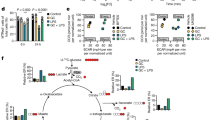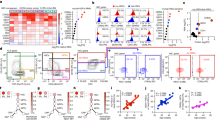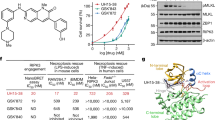Abstract
Interleukin-10 (IL-10) and interleukin-4 (IL-4), two Th2-derived cytokines, are molecules with anti-inflammatory and immunodeviating properties whose direct expression in allografts may prolong graft survival. Recombinant adenoviruses represent efficient vectors for gene tranfer in quiescent cells in vivo. Adenoviral vectors encoding rat IL-10 (AdIL-10), rat IL-4 (AdIL-4) or β-galactosidase (AdlacZ) or without transgene (Addl324) were injected directly into rat hearts at the time of transplantation in order to test their potential to prolong heart allograft survival. Expression of vectorized sequences was confirmed in heart biopsies, and kinetic analysis of β-galactosidase showed transient expression. Cardiac allograft survival was significantly prolonged after administration of 109 p.f.u. of AdIL-10 (16.6 ± 3.2 days, P < 0.05), but not adil-4 (9.8 ± 1.6 days), compared with addl324-treated (9.3 ± 3.3 days) or untreated groups (7.8 ± 1.5 days). immunohistochemical analysis of allografts after gene transfer of il-10 showed that leukocyte infiltration was quantitatively equivalent to that seen in control groups but with a strong tendency towards lower levels of cd8+ cells. Importantly, adenovirus-derived IL-10 modified the functional status of leukocytes by inducing a significant decrease in IFN-γ production but significantly increased transforming-growth factor β1 (TGF-β1) expression within the grafts compared with those treated with Addl324. These results show that expression of IL-10 by rat hearts after gene transfer mediated by an adenoviral vector decreases allogeneic immune responses and allows prolongation of allograft survival.
This is a preview of subscription content, access via your institution
Access options
Subscribe to this journal
Receive 12 print issues and online access
$259.00 per year
only $21.58 per issue
Buy this article
- Purchase on Springer Link
- Instant access to full article PDF
Prices may be subject to local taxes which are calculated during checkout



Similar content being viewed by others
References
Nickerson P et al. Manipulation of cytokine networks in transplantation. False hope or realistic opportunity for tolerance Transplantation 1997 63: 489–494
Piccotti JR et al. Are Th2 helper T lymphocytes beneficial, deleterious or irrelevant in promoting allograft survival? Transplantation 1997 63: 619–624
Josien R et al. A critical role for transforming growth factor-β (TGF-β) in donor transfusion-induced allograft tolerance J Clin Invest 1998 102: 1920–1926
Letterio J, Roberts A . Regulation of immune responses by TGF-β Ann Rev Immunol 1998 16: 137–161
de Waal Malefyt R, Moore KW . Interleukin-10. In: Angus T (ed.) The Cytokine Handbook Academic Press: London 1998 pp 333–364
Kennedy MK et al. Interleukin-12 regulates the proliferation of Th1, but not Th2 or Th0, clones Eur J Immunol 1994 24: 2271–2278
Chomarat P, Banchereau J . An update of interleukin-4 and its receptor Eur Cytokine Netw 1997 8: 333–344
David A et al. Anti-adenovirus immune responses in rats are enhanced by interleukin-4 but not interleukin-10 produced by recombinant adenovirus Hum Gene Ther 1998 9: 1755–1768
Goerdt S, Orfanos C . Other functions, other genes: alternative activation of antigen-presenting cells Immunity 1999 10: 137–142
Anegon I, David A, Charreau B, Soulillou J-P . Somatic gene transfer in transplantation. In: Strom T (ed.) Somatic Gene Transfer in Transplantation Lippincott-Raven Press: New York 1996 pp 689–699
Kovesdi I, Brough D, Bruder JT, Wickham T J . Adenoviral vectors for gene therapy Curr Opin Biotechnol 1997 8: 583–589
Kass-Eisler A et al. Quantitative determination of adenovirus-mediated gene delivery to rat cardiac myocytes in vitro and in vivo Proc Natl Acad Sci USA 1993 90: 11498–11502
Guzman RJ et al. Efficient gene transfer into myocardium by direct injection of adenovirus vectors Circ Res 1993 73: 1202–1207
Wang J, Ma Y, Knechtle S . Adenovirus-mediated gene transfer into rat cardiac isografts Transplantation 1996 61: 1726–1729
Mühlhauser J et al. Safety and efficacy of in vivo gene transfer into the porcine heart with replication-deficient, recombinant adenovirus vectors Gene Therapy 1996 3: 145–153
Donahue J et al. Acceleration of widespread adenoviral gene transfer to intact rabbit hearts by coronary perfusion with low calcium and serotonin Gene Therapy 1998 5: 630–634
Yang Y, Ertl HCJ, Wilson J . MHC class-I restricted cytotoxic T lymphocytes to viral antigens destroy hepatocytes in mice infected with E1-deleted recombinant adenovirus Immunity 1994 1: 433–442
Tripathy SK, Black HB, Goldwasser E, Leiden JM . Immune responses to transgene-encoded proteins limit the stability of gene expression after injection of replication-defective adenovirus vectors Nature Med 1996 2: 545–550
David A et al. Adenovirus-mediated gene transfer in rat liver of IL-4 but not IL-10 produces severe acute hepatitis Cytokine 1997 9: 818–829
Bejarano MT et al. Interleukin 10 inhibits allogeneic proliferative and cytotoxic T cell responses generated in primary mixed lymphocyte cultures Int Immunol 1992 4: 1389–1397
Péguet-Navarro J et al. Interleukin-10 inhibits the primary allogeneic T cell response to human epidermal Langerhans cells Eur J Immunol 1994 24: 884–891
Groux H et al. A CD4+ T-cell subset inhibits antigen-specific T-cell responses and prevents colitis Nature 1997 389: 737–742
Qin L et al. Retrovirus-mediated transfer of viral IL-10 gene prolongs murine cardiac allograft survival J Immunol 1996 156: 2316–2323
Qin L et al. Adenovirus-mediated gene transfer of viral interleukin-10 inhibits the immune response to both alloantigen and adenoviral antigen Hum Gene Ther 1997 8: 1365–1374
Fabrega AJ, Fasbender AJ, Struble S, Zabner J . Cationic lipid-mediated transfer of the IL-10 gene prolongs survival of allogeneic hepatocytes in Nagase analbuminemic rats Transplantation 1996 62: 1866–1871
Zheng XX et al. Administration of noncytolytic IL-10/Fc in murine models of lipopolysaccharide-induced septic shock and allogeneic islet transplantation J Immunol 1995 154: 5590–5600
Lee M et al. Pancreatic islet production of murine interleukin-10 does not inhibit immune-mediated tissue destruction J Clin Invest 1994 93: 1332–1338
Qian S et al. Systemic administration of cellular interleukin-10 can exacerbate cardiac allograft rejection in mice Transplantation 1996 62: 1709–1714
Bugeon L et al. Peripheral tolerance of an allograft in adult rats. Characterization by low interleukin-2 and interferon-γ mRNA levels and by strong accumulation of major histocompatibility complex transcripts in the graft Transplantation 1992 54: 219–225
Josien R et al. Graft-infiltrating T helper cells, CD45RC phenotype, and Th1/Th2-related cytokines in donor-specific transfusion-induced tolerance in adult rats Transplantation 1995 60: 1131–1139
Bugeon L et al. Similar levels of granzyme A and perforin mRNA expression in rejected and tolerated heart allografts in donor-specific tolerance in rats Transplantation 1993 56: 405–408
Vossen A, Tibbe G, Benner R, Savelkoul H . T-lymphocyte and cytokine-directed strategies for inhibiting skin allograft rejection in mice Transplant Proc 1995 27: 380–382
Lang T, Krams SM, Martinez OM . Production of IL-4 and IL-10 does not lead to immune quiescence in vascularized human organ grafts Transplantation 1996 62: 776–780
Levy AE, Alexander JW . Administration of intragraft interleukin-4 prolongs cardiac allograft survival in rats treated with donor-specific transfusion/cyclosporine Transplantation 1995 60: 405–406
Takeuchi T et al. Murine interleukin-4 transgenic heart allograft survival prolonged with down-regulation of the Th1 cytokine mRNA in grafts Transplantation 1997 64: 152–157
Guillot C et al. Lethal hepatitis with prominent apoptosis after gene transfer of IL-4 in rat liver: evidence for a minor role of T cell and macrophage-mediated immune responses 2000 (submitted)
Tepper RI et al. IL-4 induces allergic-like inflammatory disease and alters T cell development in transgenic mice Cell 1990 62: 457–467
Gilleece MH et al. Recombinant human interleukin-4 (IL-4) given as daily subcutaneous injections – a phase I dose toxicity trial Br J Cancer 1992 66: 204–210
McWhinnie DL et al. Morphometric analysis of cellular infiltration assessed by monoclonal antibody labeling in sequential human renal allograft biopsies Transplantation 1986 42: 352–358
Larsen CP et al. Long-term acceptance of skin and cardiac allografts after blocking CD40 and CD28 pathways Nature 1996 381: 434–438
Josien R et al. Recombinant IFN-gamma abrogates allograft tolerance induced by donor-specific blood transfusion by restoring alloantibody production Eur J Immunol 1999 29: 317–326
Marth T, Strober W, Seder RA, Kelsall BL . Regulation of transforming growth factor-β production by interleukin-12 Eur J Immunol 1997 27: 1213–1220
Qin L, Ding Y, Bromberg JS . Gene transfer of transforming growth factor-ß1 prolongs murine cardiac allograft survival by inhibiting cell-mediated immunity Hum Gen Ther 1996 7: 1981–1988
Lieubeau B et al. The role of transforming growth factor beta 1 in the fibroblastic reaction associated with rat colorectal tumor development Cancer Res 1994 54: 6526–6532
Acknowledgements
We are grateful to Valia Proust, Helga Smit and Claire Usal for performing heart transplantations and to researchers that contributed with reagents. This work was financed in part by the Association pour la Recherche sur le Cancer and the Fondation Transvie and European Union grant Biomed2 BMM-CT98–3277.
Author information
Authors and Affiliations
Rights and permissions
About this article
Cite this article
David, A., Chétritt, J., Guillot, C. et al. Interleukin-10 produced by recombinant adenovirus prolongs survival of cardiac allografts in rats. Gene Ther 7, 505–510 (2000). https://doi.org/10.1038/sj.gt.3301114
Received:
Accepted:
Published:
Issue Date:
DOI: https://doi.org/10.1038/sj.gt.3301114
Keywords
This article is cited by
-
Anti-inflammatory effect by lentiviral-mediated overexpression of IL-10 or IL-1 receptor antagonist in rat glial cells and macrophages
Gene Therapy (2010)
-
Prolongation of heart allograft survival after long-term expression of soluble MHC class I antigens and vIL-10 in the liver by AAV-plasmid-mediated gene transfer
Langenbeck's Archives of Surgery (2008)
-
Effects of local and systemic viral interleukin-10 gene transfer on corneal allograft survival
Gene Therapy (2007)
-
Lentivirus-mediated gene transfer of viral interleukin-10 delays but does not prevent cardiac allograft rejection
Gene Therapy (2005)
-
Dendritic cells genetically engineered to express IL-4 exhibit enhanced IL-12p70 production in response to CD40 ligation and accelerate organ allograft rejection
Gene Therapy (2003)



